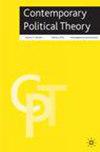新自由主义法西斯主义?早期新自由主义思想中的法西斯趋势及其在当今的回响
IF 0.7
3区 社会学
Q1 POLITICAL SCIENCE
引用次数: 0
摘要
本文通过考察20世纪30年代和40年代活跃于新自由主义和法西斯主义组织中的政治行动者的思想,对新自由主义和法西斯主义原则的当代趋同进行了理论化。我认为,对法西斯主义的同情形成了早期新自由主义思想中一个次要但重要的部分,而揭示导致某些思想家和政治行动者相信法西斯主义与新自由主义相容的逻辑,可以为当代政治时刻提供启示。根据我对早期“新自由主义法西斯主义者”的阅读,我提出了三个趋同点。第一个是相信社会主义必须用一切可能的手段来反对,包括暴力和对大众民主的镇压。第二个是对市场经济基础的种族化理解,导致接受种族排斥的必要性。第三,法西斯主义和新自由主义思想家都认为,父权制是资本主义再生产的必要特征,因此,传统的性别角色必须保留下来,以应对社会变革的压力。在理论化这种趋同的过程中,我也指出了新自由主义和法西斯主义的重叠在当代环境中是如何被见证的,重点是自由主义的米塞斯研究所。本文章由计算机程序翻译,如有差异,请以英文原文为准。
Neoliberal fascism? Fascist trends in early neoliberal thought and echoes in the present
Abstract This article theorises the contemporary convergence of neoliberal and fascist principles by examining the thought of political actors in the 1930s and 1940s who were active in both neoliberal and fascist organisations. I suggest that a sympathy for fascism formed a minor but significant strand of early neoliberal thought, and that unpacking the logics that led particular thinkers and political actors to believe that fascism was compatible with neoliberalism can shed light on the contemporary political moment. Based on my reading of early ‘neoliberal fascists’, I theorise three points of convergence. The first was a belief that socialism had to be opposed by all possible means, including violence and the repression of popular democracy. The second was a racialized understanding of the underpinnings of the market economy, leading to an acceptance of the necessity of racial exclusion. Thirdly, both fascist and neoliberal thinkers believed that patriarchy was a necessary feature for the reproduction of capitalism, and hence that traditional gender roles had to be preserved against pressures for social change. In theorising this convergence, I also gesture to how the overlap of neoliberalism and fascism can be witnessed in the contemporary milieu, with a focus on the libertarian Mises Institute.
求助全文
通过发布文献求助,成功后即可免费获取论文全文。
去求助
来源期刊

Contemporary Political Theory
POLITICAL SCIENCE-
CiteScore
3.30
自引率
5.60%
发文量
65
期刊介绍:
Founded in the UK in 2002, Contemporary Political Theory has quickly established itself in the top rank of peer-reviewed journals in political theory and philosophy. Under new editorship in 2010, the journal is now based in both the USA and UK and reaches out to authors and readers in Europe, Asia and Oceania. It will continue, through a rigorous peer-review process, to seek out the very best work from the wide array of interests that constitute ‘contemporary political theory’: from post-structuralist thought to analytical philosophy, from feminist theory to international relations theory, from philosophies of the social sciences to the cultural construction of political theory itself. The editors welcome submissions from disciplines outside philosophy and political science, including but certainly not limited to: geography and anthropology, women’s studies and gender studies, cultural studies and economics, literary theory and film studies. Contemporary Political Theory publishes a challenging and eclectic mix of articles that contribute both to rethinking what political theory is and does, and to promoting lively engagements with contemporary global politics.
 求助内容:
求助内容: 应助结果提醒方式:
应助结果提醒方式:


